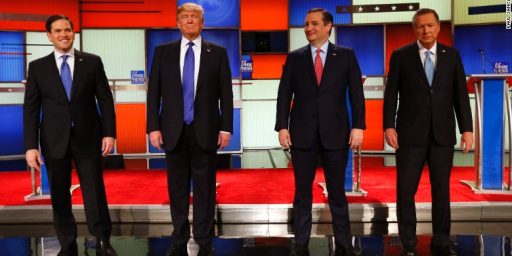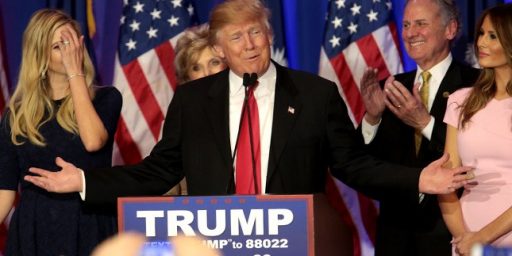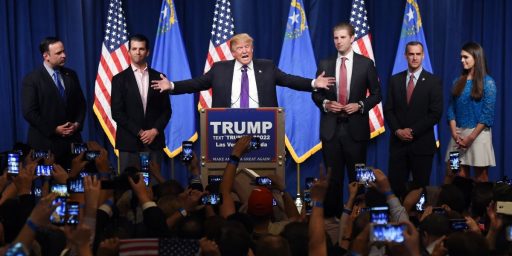The Latest ‘Stop Trump’ Effort Is Probably Too Little, Too Late
A renewed internal GOP fight to stop Donald Trump seems to be doomed to fail.
As Dan Balz puts it, last night was a nightmare for the Republican establishment and its options for stopping Trump are quickly dwindling:
The window for stopping Donald Trump closed almost completely Tuesday night, leaving the demoralized anti-Trump forces with two weeks and no agreed-upon strategy for denying the New York billionaire the Republican presidential nomination.
Trump pulled out victories in seven of the 11 contests that made up the biggest single primary-caucus night of the nominating season. His remaining rivals — Sen. Ted Cruz of Texas, Sen. Marco Rubio of Florida and Ohio Gov. John Kasich — and their allies were left to cling to the flimsiest of hopes that a reversal of his fortunes still lies on the near horizon.
For Rubio, the hope of many in the establishment, Super Tuesday turned into a super disappointment. He made a run at Trump in Virginia but fell short. Late Tuesday, he was declared the winner in the Minnesota caucuses. Still, that left his win-loss record this year at 1-14. Meanwhile, he was running third in at least half the states, and in some of those states his percentage of the vote was low enough that he was in danger of winning few or no delegates.
Rubio has been described by many as the future of his party. His performance to date instead has reinforced his image as a politician who has not lived up to that potential. Were it not for the Washington suburbs in Northern Virginia, where a well-educated and government-connected electorate gave him support strong enough to place second, his bad day would have been even more dispiriting.
Despite five days of relentless attacks on Trump, which started at last week’s GOP debate in Houston and carried through a raucous weekend of campaigning, Rubio was not able to deliver significant results. He scored well among late-deciding voters; in Virginia they favored him over Trump by about 20 points. But there were not enough of them to overcome the hold Trump has on anti-establishment Republicans who remain in control of the nominating battle.
Cruz did more than enough to argue that he should become the main challenger to Trump, carrying his home state of Texas, as he had long predicted, as well as Alaska and Oklahoma. Along with his victory in the Iowa caucuses at the beginning of last month, he remained through much of Tuesday night the only Republican who could say he had defeated the party’s front-runner anywhere.
(…)
Today, those desperate to prevent Trump from hijacking the party recognize his strength and his seeming inevitability but seem powerless to stop him.
Some believe that the most realistic scenario for stopping Trump begins with victories by Cruz, Kasich and Rubio in their home states. Cruz managed that Tuesday; Rubio and Kasich face those tests March 15. Theoretically, that could lock up enough delegates against Trump to prevent him from winning a majority before the Republican convention and force a battle in Cleveland in July for the nomination.
Another scenario calls for two of the three remaining viable candidates to quit the race, allowing the party to consolidate around a single remaining challenger. People have been talking about that for months. When he quit the race last year, Wisconsin Gov. Scott Walker said others should follow his lead in order to bring the anti-Trump forces together early enough to make a difference. What’s to say that will happen in time to make a difference in the trajectory of the race?
The fallacy of all this talk was underscored by former Utah governor Mike Leavitt.
“There’s this fallacy that some small group can get together and decide the outcome of this,” he said. “That does not exist. This is a marketplace of political ideas. The party is responsible for its structure but cannot dictate the outcome.”
In the coming weeks, the big tests for Trump, and for the effort by the Republican establishment and conservatives, will be in Michigan, Florida, and Ohio. If Trump manages to win all three then this race will effectively be over. The field would likely be winnowed significantly since losing both Michigan and his home state would eliminate whatever logic John Kasich has for staying in the race would be largely eliminated. Even if Kasich manages to win one of these states, and most likely it would be Ohio rather than Michigan, he really doesn’t have a plausible path to victory on his own and would likely only serve to syphon off votes from either Marco Rubio or Ted Cruz in contests between those candidates and Trump, something that of course works to Trump’s advantage. Losing Florida would also likely mean the end of Marco Rubio’s campaign since it’s hard to see how his campaign could credibly continue after losing his home state and likely having only one win, last night’s Minnesota Caucus victory, to his credit. At that point, there could potentially be just a one-on-one battle between Trump and Texas Senator Ted Cruz, which is hardly the ideal outcome from the perspective of many on Capitol Hill given Cruz’s reputation there. Even in such a head-to-head match-up, the idea that Cruz would be easily able to beat Trump seems naive at best since it assumes that Cruz would get the majority of the non-Trump voters supporting other candidates is seemingly refuted by polling that suggests that those supporters would divide nearly evenly between Cruz and Trump and others that show that a slight majority would actually go to Trump over Cruz. Given that Cruz generally appeals to hard-right conservatives rather than more moderate voters, this isn’t entirely surprising.
Another “stop Trump” scenario unfolds if you assume that Kasich and/or Rubio, or both, manage to win their home states. In that case, the game becomes one in which the non-Trump candidates try to trade off enough wins going forward to deny Trump the majority of delegates prior to the convention in the hopes of forcing a floor fight in Cleveland. The problem with this scenario is two-fold. First, the longer the field remains crowded with three or four non-Trump candidates, the easier it becomes for Trump to rack up wins by simply winning a plurality of the votes going forward. Given that we’re headed into a period where many of the primaries will be winner-take-all, this plan would obviously quickly backfire on the candidate and party leadership and Trump would easily walk into Cleveland with a majority of delegates at which point denying him victory would be essentially impossible. Even if the scenario were to somehow succeed, though, Trump would still likely end up with far more delegates than any other candidate and a scheme on the floor of the convention that would deny him the nomination and hand it off to someone who had fewer delegates, and less over the overall popular vote, would be seen as highly undemocratic to outside observers and would tarnish any potential nominee as someone who didn’t really represent the majority of their own party. In such a situation, many of the people who supported Trump, and possibly even some of the other candidates, could end up voting for someone else on Election Day or just staying home. While the results in the Presidential race and down ballot elections in such a case might not be quite as bad for the GOP as if Trump were at the top of the ticket, they wouldn’t be a path to victory either and would likely put vulnerable Senators at risk at the very least.
The efforts to “stop Trump,” in other words, are far more difficult than the assured words of candidates like Ted Cruz and Marco Rubio let on, and as the hopes of Republican insiders would seem to hope for. If such an effort were going to succeed, then it probably should have started months ago. At this point, though, the windows are closing and, even as some top Republican donors are apparently talking about pouring new money into a SuperPAC meant to stop Donald Trump from winning the nomination, the odds that such an effort can succeed would seem to be somewhere between slim and none. All of this suggests that we’re like to see a chasm develop in the Republican Party that could last for some time to come:
“If the Republican Party were an airplane, and you were looking out a passenger window, you would see surface pieces peeling off and wonder if one of the wings or engines was next,” said Tim Pawlenty, the former governor of Minnesota and a Republican candidate for president in 2012.
Even as he rolled up commanding victories in seven states on Tuesday, Mr. Trump confronted a loud and persistent refusal to rally around him as leading figures in his own party denounced his slow disavowal of white supremacists, elected officials boldly discouraged constituents from backing him, and lifelong Republicans declared that they would boycott the election if he is their nominee.
“I could not in good conscience vote for Trump under any circumstance,” said Blake Lichty, 33, a Republican who worked in the George W. Bush administration and now lives near Atlanta.
“If this becomes the Trump Party,” he added, “we’re going to lose a lot of people.
“I could not in good conscience vote for Trump under any circumstance,” said Blake Lichty, 33, a Republican who worked in the George W. Bush administration and now lives near Atlanta.
“If this becomes the Trump Party,” he added, “we’re going to lose a lot of people.
Even as Mr. Trump’s performance Tuesday illustrated his strength, Senator Ted Cruz’s success in Texas, Oklahoma and Alaska underscored the broader Republican dilemma: There is no consensus among Republicans about who could be Mr. Trump’s most formidable opponent, and there is probably not enough time for one to emerge.
The cultural and ideological fissures opening in the party could take a generation to patch, according to Republican leaders, historians and strategists — and many are convinced that Mr. Trump will guarantee Democrats another four years in the White House. “Nominating Donald Trump would be the best gift the Republican Party could give to Hillary Clinton,” Bobby Jindal, the former Louisiana governor, said in an interview on Tuesday.
Notwithstanding the fact that Richard Nixon ended up winning the White House four years after the electoral disaster in 1964, it arguably took until Ronald Reagan’s victory in 1980 for the fissures created in 1964 to begin to heal, and longer than that, perhaps not until George H.W. Bush’s win in 1988 or even the Republican takeover of Congress in 1994, for them to heal completely. In those cases, the healing was helped along by electoral success and a Presidency that helped revive a nation that had been stuck in the post-Vietnam doldrums for the better part of a decade. This time around, it could take longer, especially given the fact that modern technology and media habits mean that people tend to burrow themselves into ideological and intellectual bubbles, and there is an entire industry on the right that seems to thrive on creating conflict within the Republican coalition rather than promoting harmony and compromise. Additionally, any effort by party insiders to try to take the nomination away from Trump could be perceived by his supporters and by others as further evidence in the argument that the so-called establishment cannot be trusted. As long as that’s the case, healing would be next to impossible.
In other words, the costs of a “stop Trump” effort could be quite substantial even if it does succeed. As I’ve noted, perhaps he could have been stopped months ago but most of the people now alarmed by his rise sat on the sidelines, either because they were afraid of becoming the target of his attacks or because they believed that he would eventually implode. Now, with Trump having won all but five of the first ten contests of the 2016 election cycle and seemingly on a path that will eventually get him the delegates he needs to become the Republican Presidential nominee, their efforts seem to be too little, too late and only likely to further tear their party apart.






I’m skeptical. I think within a few months all those Republicans in such a tizzy will find some reason or other to support Trump, because Those Horrible Democrats Are Even Worse.
And they’ll be able to control Trump, of course.
@grumpy realist:
I tend to agree with you on many things, but I don’t know if Trump can overcome the loathing for him that many Republicans have.
If I were a Republican, I would try to get the best possible data on what is driving people to support Trump. I see a lot of people guessing (including me) that it’s mostly racists, or mostly anti-establishment types, or whatever, but there’s also the possibility that some people are considering his economic proposals.
There was a pretty good article on Slate last week about what some of those positions were. Trump supports some ideas like wage guarantees, strengthening Medicare and SS, etc. We already know that many of his supporters are low-income, and not coincidentally those proposals would help those very people.
Of course Trump and his supporters seem a tad confused as to the difference between a President and a dictator, and there’s many odious sides to Trump, but to be honest there are some things in which he would actually be able to make deals with Democrats, just like he says.
If the “establishment” wants to “stop Trump” they need to make Marco Rubio go away for a while. Cruz can beat Trump, but only if Marco stops hanging around their necks.
@James Pearce:
Rubio supporters will tell you that the point about Rubio staying is that he’s the least detestable of the three Republican contenders.
@Franklin: Can we really say that Trump has stated any real positions whatsoever?
He’ll say whatever is necessary to Seal The Deal. Delivering it is an entirely different matter. Witness that whole “we’ve raised $6M for the veterans” sort of thing. Delivered 1/10 and well, too bad about the rest. The parade has moved on; no one’s gonna hold his feet to the fire to deliver on that promise.
If he gets into the Presidency, we’re going to discover the same mechanism, I bet. All those quasi-promises he said that people listened to and interpreted as meaning what they wanted to hear? Oh, those weren’t actual promises. Those were wish-lists. Or “aspirational goals”. Or whatever.
@grumpy realist:
Actually he would call them negotiating points, as in “everything’s negotiable.”
I think we’re seeing the start of this. Lindsey Graham is calling for Republicans to unify around Cruz to beat Trump.
Coming from someone who less than a month ago described a choice between Cruz and Trump as akin to being shot or poisoned, I think there a big CTJ (come to Jesus) moment going on right now in the GOP. I don’t know how that’s going to work, Cruz is despised. Even my ardently Republican parents can’t stand him and don’t want him as the nominee.
@CSK:
His lack of detestability might be why he’s in 3rd place.
At this point, Rubio is not challenging Trump’s candidacy. He’s just spoiling Cruz’s chances.
(My preference, if it must be stated, is for none of them.)
@Jen:
Cruz gambled that by making himself despised by his colleagues, he’d make himself the beloved of the “base,” and he could ride that populist wave into the White House.
But then he was pre-empted by a really world-class sleazeball. Cruz is Uriah Heep in comparison.
I think the R establishment will come around to Trump when he wins the nomination because I’m sure they will be glad to assist him in choosing his cabinet and his staffers. There are plenty more Cheneys and Rumsfelds out there.
@Mr. Prosser: As said, they’ll find reasons to go along with him.
Didn’t Cruz win some of the states that have investments into oil or some such?
Texas, Alaska and Oklahoma? Or am I mistaken?
I find it impressive that the workers depending on oil and gas mostly supported him. Perhaps even more so than the Evangelicals. Too bad there are not many more of them out there. 🙂
@Franklin: Oh fer… That link is Reihan Salam’s usual ‘the Republican Party must stop being the Republican Party’. Yes, Trump may be well on the way to making the Republican Party not the Republican party. But can he really think that in order to save the party the .01% are going to voluntarily give up the Republican Party being the party that supports the interests of the .01%?
Tyrell! R U listening?
I find it interesting that none of the plans to stop Trump actually involve addressing the issues that caused the Trump voters to reject the other Republican candidates.
@Mr. Prosser: I think the R establishment will come around to Trump when he wins the nomination because I’m sure they will be glad to assist him in choosing his cabinet and his staffers. There are plenty more Cheneys and Rumsfelds out there.
And this is why Trump as president can’t be anything other than awful. His favorite SCOTUS judge is Thomas! He thinks Cheney didn’t use torture enough. He’d get rid of the EPA in the face of Flint and numerous other outrages. His social security policy is that everyone would be so insanely wealthy there would be nothing to fix. Trump treats policy like a joke. Digby had a great analysis and pointed out that he is running as a white nationalist. He’s been a racist for many years, this is nothing new to anyone who lived in the NY metropolitan are back in the 80’s.
The Republican debates are 90% about personality and style. I’m praying that in the general election debates Trump is forced to put forth coherent policies, and won’t get away with saying everything will be Yoooge success.
@David M:
Part of the problem with that is Trump has been on both sides of every issue. He wants to help the working guy but his tax cuts all go to the rich. He’s been pro-choice and anti-choice. He’s a free-trader who wants to put a 45% tariff on Chinese goods.
When you really come down to it the only differentiating thing is that he is not seen as part of the Republican Party…how in the world do Republicans fight that?
Gadzooks…only about 1% of what he says is true…and yet his supporters think he is the only honest broker out there. How in the world does anyone fight that?
http://www.politifact.com/personalities/donald-trump/
As I said the other day…the only way to fight Trump is to show him as the insecure weakling that he is. He’s running on this idea that he can walk into Washington, the Middle East, China, and Mexico and kick ass and take names. You have to show that personna to be completely phony…as it most definitely is.
@David M:
Immigration?
@James Pearce:
I tend to think stagnant middle class wages are the key component of Trump actually winning. Sure, he could get some traction in the GOP with immigration, but he couldn’t get to where he is without the flat wages. (I’m not saying Trump will do anything to actually fix it)
Breaking…
Mitt Romney is giving a big Anti-Trump speech on Thursday.
Trump is now officially a shoe-in for the nomination.
@grumpy realist: All true. He panders and overpromises, possibly better than most seasoned politicians. And Lord is he a blowhard. I hope I didn’t come across as pro-Trump. All I’m saying is that Republicans would do well into looking what he is promising to the working man; it’s not the usual tax cuts for the rich crap.
That said, gVOR08 hits close to the mark here. It’s a non-starter to a large proportion of the Republican party.
@C. Clavin: Heh, I was *almost* hoping for it to be him throwing his hat in the ring, but alas we’ve already been told no.
@Franklin:
But it is. That’s the beauty of a grifter. You can hear what you want to hear.
http://fortune.com/2015/12/23/donald-trump-plan-tax-policy-center/
@C. Clavin: Has Bill Kristol predicted that Trump can not possibly win? That would seal the deal.
@Gromitt Gunn:
True dat!!!! Or Dick Morris!!! Or Guarneri….
@Gromitt Gunn:
Why yes, Kristol has issued a guarantee that Trump will not be the Republican nominee…
This is probably the best thing you’ll read all day…
Chris Christie’s wordless screaming
It only gets better from there.
@Franklin: That’s how Trump wheels and deals. Promise promise promise whatever to the gullible marks, then when the stuff hits the fan bluster about how he’s been a YUUUGE success and how everyone loves him and well, those complaints? They’re just from “losers”
There’s a reason why Trump ended up as a TV talk-show host. Even as a NYC real estate guru he’s petty potatoes, because people don’t want to work with him.
@Mikey: I think this is my favorite line:
I just had to post this link….
(I guess no one ever told Trump about Lincrusta?)
@CSK: “But then he was pre-empted by a really world-class sleazeball. Cruz is Uriah Heep in comparison.”
Minor league newbie a-hole ran into a major league veteran a-hole.
@grumpy realist:
Just a couple of months ago, I would have agreed with you 100%. In fact I still think you’d be right if we were talking about any candidate other than Trump–including Cruz. But we’re in uncharted territories now, and the notion that “Parties always line up with their nominees, no matter how bitter the intra-party fight in the primaries” comes from the same well of safe assumptions as “Donald Trump couldn’t possibly win the GOP nomination.” That doesn’t automatically mean it’s wrong, but it does mean we should question it.
We really need to take a few steps back and pause to reflect on how effing bizarre the rise of Trump is. Nothing like this has happened in my lifetime–probably never in American history. McGovern? Goldwater? Wendell Willkie? Not even close.
So you can’t really compare it to the PUMAs in 2008 or the Republicans who backed McCain over Bush in the 2000 primaries. Nobody likes to lose, people get passionate when their preferred candidate fails to make the cut, but at the end of the day these were all relatively conventional candidates, and most people realized it.
That isn’t the case now. Trump isn’t simply a candidate some Republicans dislike, he’s a complete wild card. Nobody has a clue how he’d govern if he ever reaches the White House. And Republican elites know it. This makes him different from even Cruz, where there’s at least some rough idea of what he’d do in office, what sorts of policies he’d push, what federal appointments he’d make. Trump might end up behaving more like a mainstream Republican (for better or worse) than some of us are predicting. But then, he just might nominate Jesse Ventura to the Supreme Court or send tweets that Angela Merkel is ugly or that Kim Jong-un has a tiny dick.
You can’t just make the blanket statement that all Republicans everywhere are motivated by hatred of Hillary and the Dems as a first principle. I suspect that a hefty chunk of them, whether they admit it openly or not, recognize that she’d be less of a risk to the country than a President Donald. Factoring into their decision will be the crucial consideration that the Dems don’t stand much of a chance of winning back the House of Representatives, meaning that her presidency isn’t likely to become a golden age of progressivism. They may not like it, but some of them may well realize it’s something they can live with–and at any rate something they can game out.
And sorry, the idea that they could control Trump is farcical. He’s well aware he owes them nothing, that he got to where he is entirely in spite of them. And why would you expect a man who still is plotting against the journalist who called him a “short-fingered vulgarian” 25 years ago to let them off so easily?
Look, I’m not denying that the majority of Republicans will get behind Trump if he’s nominated. That isn’t the question. There can still be a substantial number of defectors or people who pledge to stay home or support a third party even if it’s in the minority. And that can make a difference.
This argument is wrong in many ways. A stop Trump is NEVER too late because the point of stopping him is to stop him from being president of the United States. His becoming the standard bearer of a major political party is indeed problematic for the national image and esteem. It is however, unsurprising: The Republican Party did this to itself. They created the monster that establishment Republicans now abhor by winking at the proto-Fascism of his followers, pretending it could always be contained.
That said, the refusal of a significant number of Republicans to ever accept him as their national leader is essential in discrediting him in the general election. Whether they channel that refusal into a 3rd party candidacy, public disavowals of his racism and misogyny or “hold their noses” and vote for Clinton, all of these are essential components of a Stop Trump campaign, which is not lost. Sadly for America it is just beginning.